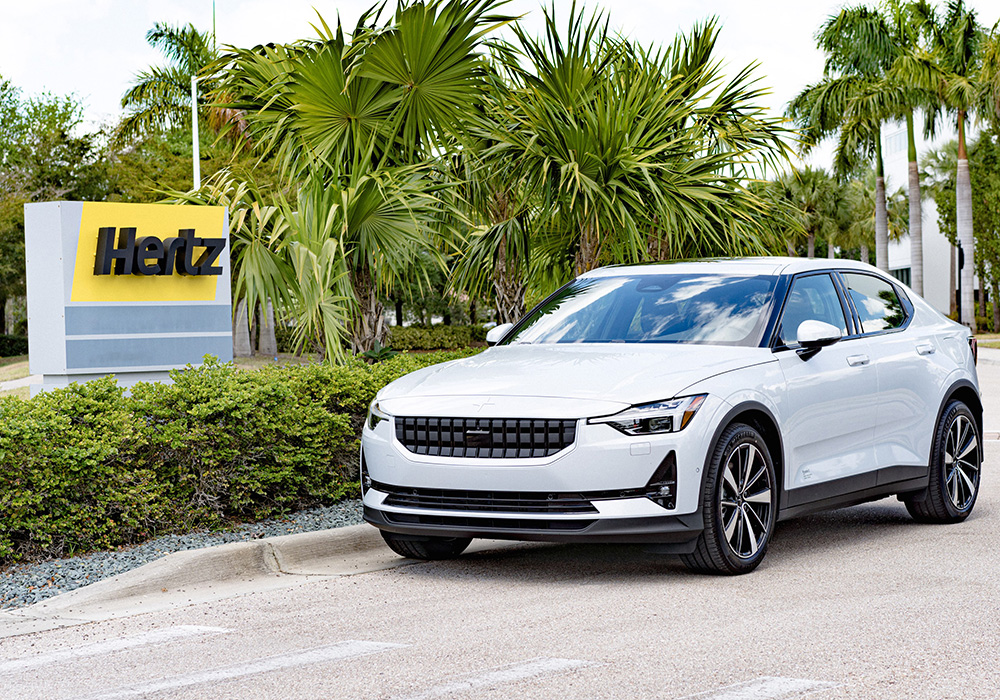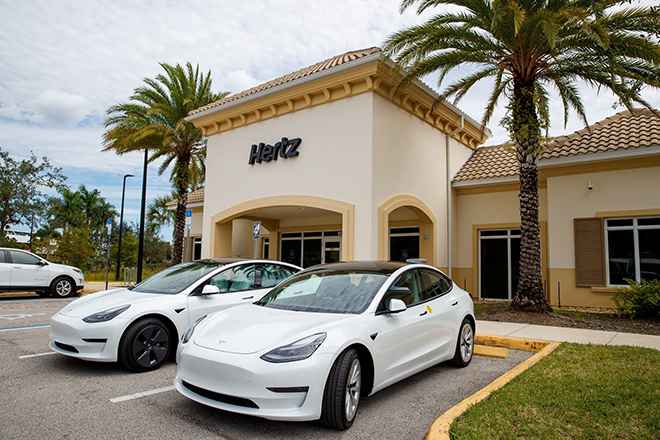It’s the kind of headline EV boosters hate, and EV boo-birds trumpet: just two years after announcing that it would buy 100,000 Teslas and a raft of other EVs, rental giant Hertz announced that it would sell 20,000 of its Teslas and replace them with tried-and-true gas-guzzlers (at this writing, the company is offering around 500 for sale to the public).
It isn’t clear if Hertz means to ditch all its Teslas, or just thin the herd. Teslas reportedly make up about 80% of Hertz’s EV fleet, and EVs make up about 11% of Hertz’s total rental fleet. It’s also not clear if all EV brands are on Hertz’s doo-doo list, or just Tesla—the rental company has also announced plans to buy EVs from GM and Polestar.
So, why the massive corporate about-face (and loss of face)?
Hertz cited expensive repairs as one of the reasons for its decision. This is a real issue (and one that Hertz should have known about). By all accounts, Tesla repair costs, especially for collision work, are higher than for other brands, and the company’s service operation doesn’t have a great reputation.
The likes of GM and other automakers have “decades of establishment of a broad national parts supply network,” Hertz CEO Stephen Scherr said on a recent analyst call. “There’s an aftermarket of parts that is there, that is less mature, obviously, in the context of Tesla.” Scherr also said that EVs are getting in more crashes. He signaled that Hertz isn’t giving up: “Our work with Tesla is to look at the performance of the car, so as to lower the risk of incidence of damage, and we’re in very direct engagement with them on parts procurement and labor.”
The pricing of the Teslas was surely another sore point. Rental companies typically buy cars at substantial discounts from MSRP, and sell them on the used market, and they pay close attention to resale values. Back in 2021 when Hertz ordered the Teslas, napkin math indicated that it had paid something near list price. In those post-pandemic days, resale prices on used EVs were sky-high, but they’ve since collapsed, and Tesla drastically dropped prices of its new cars in 2023. Hertz said it expects to lose about $245 million on the Teslas.

Hertz got whipsawed on the price, but did it get its money’s worth? Some of the used Teslas that Hertz is now selling off have close to 100,000 miles on them, far more than the point at which rental agencies usually sell. It reminds me a bit of the old comedy routine in which a restaurant-goer cleans their plate, then complains about the food (and the small portions).
Hertz also cited customer complaints about EVs, and we’ve read some comments from dissatisfied Hertz/Tesla customers—most of these are basically the usual horror stories about malfunctioning public chargers. A few Hertz employees have commented on how hard it is to manage charging—if customers don’t return the cars topped off, it’s a nightmare to get them charged and turned around quickly enough.
How much of Hertz’s misfortune was self-inflicted? As EV pundit James Carter put it, “Hertz’s decision is far more a reflection on business practices than the product.” Unhappy campers have reported problems—cars delivered with low batteries, missing charging adapters, poorly functioning apps—that point to a lack of proper training on Hertz’s part. It’s also worth noting that Hertz started experimenting with EVs in 2011, so the company has had over a decade to figure this out.
All of these factors surely contributed to this massive corporate fail, but it seems to me that if the Teslas had been a big hit with Hertz’s customers, the company would have found ways to deal with the repair, depreciation and training issues. Yes, dear readers, even this tireless EVangelist has to admit that, in the current state of technology, an EV isn’t a good fit for every driver or every application, and I’ve long been skeptical that car rental represents a good use case.
Most car rental customers are air travelers who need transportation to their final destinations. At most airports, getting into a rental car and on your way is a hassle, which rental companies go to some lengths to try to minimize. Taking time to give customers an orientation on how to drive and charge an EV doesn’t fit well with the goal of streamlining the pickup process.
Ironically, Tesla’s unique connectivity features make it possible to make the pickup and drop-off process much easier, not harder (as Turo customers know). Back in 2022, Hertz said that it would offer “a premium and differentiated rental experience for the Tesla EVs,” including “digitized guidance to educate customers about the electric vehicle to get them on their way quickly, and coming soon, an expedited EV rental booking process through the Hertz mobile app.” What happened?
Obviously, most customers are away from home, so they don’t have a place to charge. Public charging, as we all know, is no picnic, and when you add the facts that most renters are navigating strange cities, and many are driving long distances to rural destinations, finding places to charge can be a nightmare, as many a disgruntled renter has documented. (Yes, I have rented Teslas, and keeping them charged, especially charging them up before returning them, to avoid an extra fee, is a hassle.)
Someday, longer ranges, better public charging, and simply more consumer familiarity with EVs will solve the problems—a similar process happened with the internet. But at the moment, I don’t believe the majority of rental car customers are going to be happy with EVs. The good news is that, as CEO Scherr made clear, Hertz is going to apply its hard-learned lessons as it proceeds (more cautiously) with the transition.
Sources: The Mercury News, Car and Driver, Reuters

I appreciate the practical advice you’ve given here.
cheap lasuna generic – lasuna usa where can i buy himcolin
order besifloxacin for sale – sildamax online buy purchase sildamax without prescription
buy neurontin no prescription – gabapentin 100mg generic order sulfasalazine online
benemid 500mg sale – order monograph generic order carbamazepine 200mg online cheap
celecoxib us – urispas cost buy cheap generic indomethacin
buy generic diclofenac over the counter – cambia ca buy aspirin 75mg
buy rumalaya pills – purchase shallaki pill elavil without prescription
mestinon 60 mg uk – purchase azathioprine online cheap imuran 25mg generic
buy cheap generic voveran – voveran online buy cheap nimodipine pills
ozobax pill – purchase baclofen buy feldene 20mg pills
buy generic cyproheptadine online – buy generic tizanidine zanaflex brand
order artane generic – buy artane online buy voltaren gel online
omnicef order online – purchase cleocin generic cleocin uk
accutane pills – isotretinoin 20mg price order generic deltasone 20mg
order prednisone 40mg online – deltasone 5mg without prescription order permethrin
betnovate medication – purchase adapalene cream benoquin for sale
metronidazole 400mg pill – cheap flagyl 200mg brand cenforce
buy clavulanate pills for sale – cost augmentin order synthroid 150mcg for sale
buy generic clindamycin – order cleocin for sale indomethacin price
brand hyzaar – cephalexin cheap keflex 250mg over the counter
order crotamiton sale – purchase aczone pills buy aczone without prescription
provigil price – modafinil usa order generic melatonin
how to get bupropion without a prescription – buy shuddha guggulu online order shuddha guggulu pills
cheap capecitabine 500mg – danazol 100 mg over the counter order danocrine 100 mg online
order prometrium 100mg pill – order generic ponstel fertomid pill
buy alendronate online cheap – order alendronate 35mg generic oral provera 5mg
buy estradiol 2mg without prescription – buy ginette 35 online buy anastrozole 1 mg sale
order cabergoline 0.25mg – buy premarin sale alesse brand
гѓ—гѓ¬гѓ‰гѓ‹гѓігЃЇи–¬е±ЂгЃ§иІ·гЃ€г‚‹пјџ – г‚ўгѓўг‚г‚·г‚·гѓЄгѓі еЂ‹дєєијёе…Ґ гЃЉгЃ™гЃ™г‚Ѓ г‚ёг‚№гѓгѓћгѓѓг‚Ї и–¬е±ЂгЃ§иІ·гЃ€г‚‹